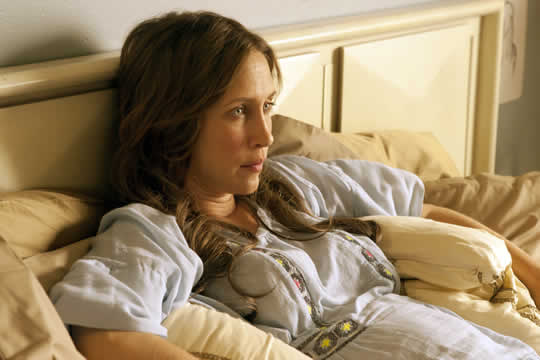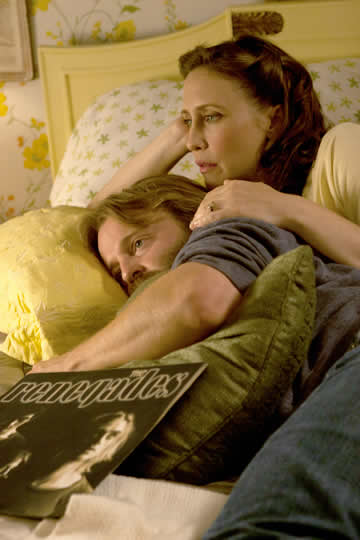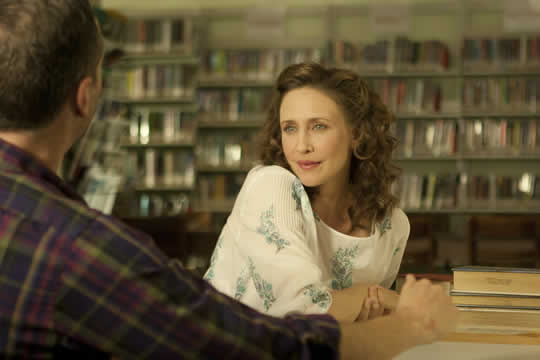 Actress Vera Farmiga emerged from the Indie film scene (as Patricia Clarkson did a decade earlier) as one of our most cherished actresses, adept in both character and lead roles. She is characteristically marvelous in her roles as Corrine, but it is her directorial debut that is the real news. With the grace that marks her performances she breathes life into a cast of characters, making us forget that the film pursues a certain polemical question.
Actress Vera Farmiga emerged from the Indie film scene (as Patricia Clarkson did a decade earlier) as one of our most cherished actresses, adept in both character and lead roles. She is characteristically marvelous in her roles as Corrine, but it is her directorial debut that is the real news. With the grace that marks her performances she breathes life into a cast of characters, making us forget that the film pursues a certain polemical question.
Farmiga’s taken on a lot of issues: Faith versus doubt, the security of doctrine vs., individual spiritual growth, and even the place erotic desire plays in sanctioned church marriages. For the most part she succeeds, walking the fine line of ambiguity that will test audience members’ reactions from both spectrums of the issue.
Carolyn S. Briggs and Tim Metcalfe’s adaptation of schoolteacher Briggs’ “This Dark World: A Memoir of Salvation Found and Lost” is a nuanced script that avoids many of the clichés and controversy inherent in a piece about fundamental Christianity. Chapter headings like “Wilderness” and “Prophet” introduce Corrine’s two decades journey from a born-again girl touched by the spirit, through would-be writer who gave up her dreams to follow her rock star husband, through pious married member of a hippyish religious commune, to a questioning woman, risking all to walk her own path.
When young Corrine raise her hand to accept Jesus Christ, Pastor Bud (Bill Irwin), the pastor of her family’s church, encourages the talented youngster (played in a casting stroke of genius by Farmiga’s much younger sister Taissa). Taissa has the same arresting delicacy and troubling eyes, and gives the sort of infolded subtle performance we’ve learned to expect from Vera. 
McKenzie Turner, another first time film actress, ably plays the youngest Corrine. Nina Arianda plays her “fallen” sister Wendy. John Hawkes and Donna Murphy are strong as her bickering parents torn apart by Dad CW’s alcoholicism. Corrine’s dysfunctional family might be the reason she falls for the local High School Rock God Ethan Miller (Boyd Holbrook). Soon she’s pregnant, a high school drop out bride, and on the road with his band, The Renegades, nursing their baby as the van lurches drunkenly from gig to gig.
When they miraculously manage to rescue their daughter from a freak accident that submerges their van, Ethan (now played by Joshua Leonard (‘Humpday”) and Corrine give thanks to God and join a born-again community run by the smooth talking, charismatic Pastor Bill, played by Norbert Leo Butz (the Tony winning Best Actor of “Dirty Rotten Scoundrels”, and yes, he does sing in the film.) The saved Corrine and Ethan become community leaders. Their growing family serves as the congregation’s in-house singing group.
It’s the sort of chauvinist community we’ve read about. While the 60’s-70’s anti-war and woman’s movement roar around them, Corrine raises kids, cooks and cleans for her bearded husband. Naturally talented Corrine, who missed her first chance at higher education, takes to Church doctrine like an intellectual (she quotes “Hebrews”!), ruffling feathers of the Church Fathers. Women believers are the first to rein her in, warning her to “not appear to be preaching.”
As much as Ethan seems to care for Corrine he’s unable to break ranks. On the surface he’s a relaxed community leader, underneath anger simmers.
Her earthy best friend Annika (Dagmara Dominczyk) a sexy pal who manages to find her way around the communities prohibitions, talks Eros with Corrine, giving her the sort of education she missed at home. Experimenting with erotic fantasies, Corrine realizes her marriage isn’t providing her the pleasure that Annika assures her is God’s plan for child bearing women.
Brain cancer fells Corrine’s only friend, leaving the vivacious Annika a wheel chair-bound vegetable who vacantly attends service. Corrine’s doubts increase. Now a loner, Corrine’s on the outs with the suspicious woman believers.
Estranged from conformist Ethan, she’s courted by her sensitive Irish mailman Liam Donovan (Sean Mahon), who she meets in the library. He recommends she read Toni Morrison’s “Beloved”.
Corrine doesn’t leave her community easily. She tries practicing speaking tongues like Annika, and wrestles privately to hear God’s voice before her farewell speech to her community. “I admire your faith” says Corrine, a grown version of the questioning girl who once managed to check the forbidden “Lord Of The Flies” out of the library.
 Farmiga draws a rich ensemble. While letting none of her characters off the hook, she treats them in an evenhanded way that gives credibility to their character arcs. No one seems mean, there are no villains, everyone acts in “good faith”.
Farmiga draws a rich ensemble. While letting none of her characters off the hook, she treats them in an evenhanded way that gives credibility to their character arcs. No one seems mean, there are no villains, everyone acts in “good faith”.
Farmiga artfully contrasts the ease of unquestioned faith and the anxiety that doubt engenders. There’s little proselytizing. The critique of the male chauvinism and conformism is allowed to develop organically as the story develops. At the same time, we experience the comforting Christian fundamentalist community at its best: the warmth of fellowship, the pleasure of shared music, the security offered to members of both the segregated women’s an men’s groups.
There’s the gentlest of satire at work, as in the scene where a hippyish bearded group leader plays sanctioned sex tapes to teach the men how to pleasure their wives, or when wives pressure her to take off her revealing, low-neckline dress (hah!) lest she tempt good men, and watch her suspiciously when she talks with someone else’s husband. Under it all, there’s the sense that some in the community are better at conforming than feeling the Holy Spirit.
Michael McDonough’s lovely HD shots of New York’s Hudson River Valley, Sharon Lomofsky’s production design, Diana Bregman’s set decoration and Amela Baksic’s costumes recall the 70’s hippy ethos while establishing a community set apart. The hymn rich soundtrack, including performances by many of the lead characters adds much.
Farmiga’s emergence as a director is reminiscent of Robert Duvall’s deft, character-driven directorial work. In a statement to the press, Farmigia said ‘”The film asks: is it possible for faith and doubt to coexist?… What holds us back from inner growth? Christianity is the ‘location’ of the film, not the subject, concern, or issue. The film could have been set just as easily in a variety of faiths or cultures. I have a deep respect for all religions; I’m most familiar with Christianity… I wanted to be reverent and respectful, and I did not want to infect the story with bias. It is about those moments in life where you lose sight of who you are, what you believe, and where you are going…The film is about finding your footing, finding higher ground.”

